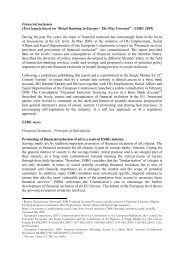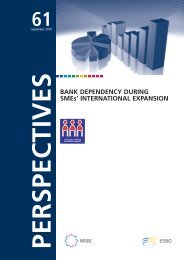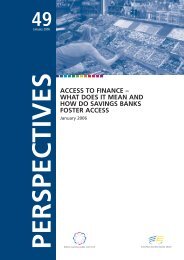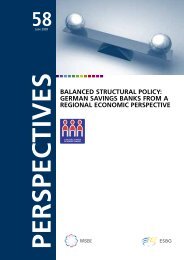A comparative analysis of the US and EU retail banking markets - Wsbi
A comparative analysis of the US and EU retail banking markets - Wsbi
A comparative analysis of the US and EU retail banking markets - Wsbi
You also want an ePaper? Increase the reach of your titles
YUMPU automatically turns print PDFs into web optimized ePapers that Google loves.
The SROs have <strong>the</strong> responsibility to develop rules<br />
which guarantee <strong>the</strong> integrity <strong>of</strong> <strong>the</strong> <strong>markets</strong> <strong>the</strong>y<br />
are responsible for <strong>and</strong> <strong>the</strong> protection <strong>of</strong> investors.<br />
These rules must be submitted to <strong>the</strong> SEC, which<br />
has to agree on <strong>the</strong>m, after having performed a<br />
public consultation. However, <strong>the</strong> SEC also has <strong>the</strong><br />
possibility to draft rules which are directly applicable<br />
to <strong>the</strong> entirety <strong>of</strong> <strong>the</strong> market.<br />
It should be noted here that in <strong>the</strong> American regulatory<br />
system, a distinction is made in terms <strong>of</strong> responsible<br />
authorities between securities <strong>and</strong> futures; in <strong>the</strong><br />
futures area, like in <strong>the</strong> securities one, supervision<br />
<strong>and</strong> regulation are organised at <strong>the</strong> federal level. In<br />
this field however, federal oversight is ensured by <strong>the</strong><br />
Commodity Futures Trading Commission (CFTC) (<strong>and</strong><br />
not by <strong>the</strong> SEC), whereas industry oversight is <strong>the</strong><br />
responsibility <strong>of</strong> <strong>the</strong> SROs – <strong>the</strong> futures exchanges<br />
<strong>and</strong> <strong>the</strong> National Futures Association (NFA).<br />
4.2.2.1.3 Responsible authorities in<br />
<strong>the</strong> insurance area<br />
The regulation <strong>and</strong> supervision <strong>of</strong> <strong>the</strong> insurance area<br />
is <strong>the</strong> exclusive responsibility <strong>of</strong> regulators at <strong>the</strong> states<br />
level, unlike in <strong>the</strong> o<strong>the</strong>r financial services sectors.<br />
The view that regulation should take place at <strong>the</strong><br />
states level was defended by <strong>the</strong> McCarren-Ferguson<br />
Act <strong>of</strong> 1945. A central structure was however<br />
established to help coordinate <strong>the</strong> approaches <strong>of</strong><br />
<strong>the</strong> 50 state regulators: <strong>the</strong> National Association <strong>of</strong><br />
Insurance Commissioners (NAIC).<br />
Historically, state regulators in <strong>the</strong> insurance area<br />
have stressed specifically <strong>the</strong> safety <strong>and</strong> soundness<br />
issues, as well as <strong>the</strong> conduct-<strong>of</strong>-business area,<br />
especially in relation to sales practices.<br />
4.2.2.2 European Union<br />
4.2.2.2.1 <strong>EU</strong> bodies<br />
In <strong>the</strong> European Union, <strong>the</strong> responsibility for supervising<br />
<strong>the</strong> financial services area lies entirely at <strong>the</strong> Member<br />
States level. There are <strong>the</strong>refore no <strong>EU</strong> bodies in <strong>the</strong><br />
financial area comparable to <strong>the</strong> <strong>US</strong> regulatory<br />
agencies. Some “Committees” however play a<br />
coordinating role, <strong>and</strong> will <strong>the</strong>refore be presented in<br />
<strong>the</strong> subsequent section “Coordination in <strong>the</strong> <strong>EU</strong>”.<br />
4.2.2.2.2 Member State level<br />
Member States are responsible for organising <strong>the</strong><br />
supervision <strong>of</strong> <strong>the</strong>ir financial services sector in <strong>the</strong><br />
way <strong>the</strong>y consider <strong>the</strong> most appropriate. Consequently,<br />
<strong>the</strong>re is much variety among <strong>the</strong> supervisory<br />
structures <strong>of</strong> <strong>the</strong> 25 individual Member States.<br />
Historically, in most <strong>EU</strong> Member States supervision<br />
was organised for each different area <strong>of</strong> <strong>the</strong> financial<br />
services sector individually: <strong>banking</strong>, securities <strong>and</strong><br />
insurance. However, this situation changed in recent<br />
years in several Member States, with a clear trend<br />
towards <strong>the</strong> establishment <strong>of</strong> a single authority to<br />
supervise <strong>the</strong> three traditional sectors. This move was<br />
<strong>of</strong>ten presented as a response to important changes<br />
in <strong>the</strong> financial sector, such as <strong>the</strong> increasing blurring<br />
<strong>of</strong> <strong>the</strong> specificities <strong>of</strong> <strong>the</strong> different types <strong>of</strong> financial<br />
services businesses <strong>and</strong> <strong>the</strong> trend towards more<br />
consolidation <strong>and</strong> conglomeration in <strong>the</strong> financial<br />
sector, especially at <strong>the</strong> level <strong>of</strong> <strong>the</strong> Member States.<br />
The first country to establish an independent single<br />
supervisory authority was <strong>the</strong> UK in 1997 with <strong>the</strong><br />
establishment <strong>of</strong> <strong>the</strong> Financial Services Authority (FSA).<br />
The FSA is responsible for <strong>the</strong> prudential supervision<br />
<strong>and</strong> more general business supervision <strong>of</strong> all financial<br />
institutions <strong>and</strong> <strong>markets</strong>. O<strong>the</strong>r countries have also<br />
re-examined <strong>the</strong>ir supervisory arrangements. A single<br />
authority was for instance created in Luxembourg 145<br />
in 1998. A proposal for a single authority in<br />
Germany 146 was put forward in January 2001 <strong>and</strong><br />
entered into force in April 2002. In Austria too, a<br />
single authority 147 was formally established in April<br />
2002. In each <strong>of</strong> <strong>the</strong>se cases, <strong>the</strong> single authority is<br />
independent from any o<strong>the</strong>r institution.<br />
National central banks also play a role in supervision.<br />
Traditionally, <strong>the</strong>ir direct role in <strong>the</strong> supervisory<br />
process was limited to <strong>the</strong> <strong>banking</strong> sector. In certain<br />
Member States however, a decline in this role has<br />
been observed in recent years as a direct consequence<br />
<strong>of</strong> <strong>the</strong> combining <strong>of</strong> financial supervisory competences<br />
in just one agency. There are never<strong>the</strong>less exceptions,<br />
such as Irel<strong>and</strong>, where a single authority has been<br />
created under <strong>the</strong> wing <strong>of</strong> <strong>the</strong> national central bank,<br />
<strong>and</strong> <strong>the</strong> Ne<strong>the</strong>rl<strong>and</strong>s, which is <strong>the</strong> first <strong>EU</strong> Member<br />
State in which <strong>the</strong> central bank will take over <strong>the</strong><br />
supervision <strong>of</strong> all three financial sectors, thus<br />
breaking with a long supervisory tradition, where <strong>the</strong><br />
role <strong>of</strong> <strong>the</strong> central bank is generally limited to<br />
maintaining financial stability.<br />
145 Commission de surveillance du Secteur Financier.<br />
146 Bundesanstalt für Finanzdienstleistungsaufsicht (BaFin).<br />
147 Finanzmarktaufsichtsbehörde (FMA).<br />
52
















